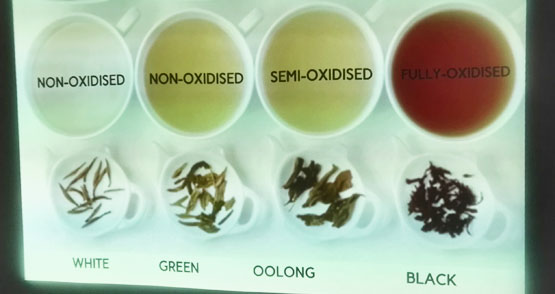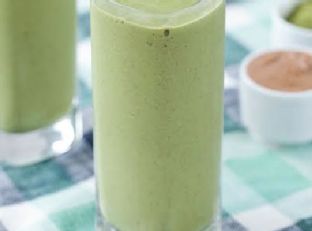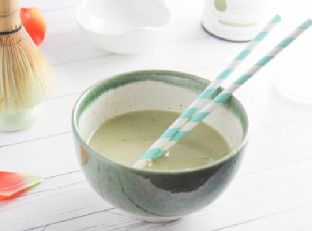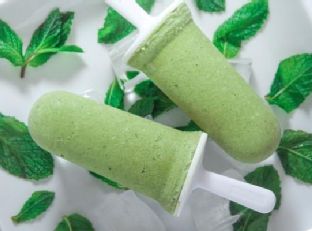I have to admit, I love health trends. Whether activated charcoal, bone broth, schisandra berry, or kombucha, I get a twinge of excitement every time something new pops up on my Instagram feed. No matter how eager I am to welcome these new foods (and the flurry of beautifully designed products containing them) with open arms, I make a point of doing some research before adding anything to my shopping cart.

After a recent trip to Japan filled with matcha, matcha noodles, matcha ice cream, matcha cookies, and matcha Kit Kats (obviously a superfood in their own right), I needed to know: in addition to becoming a cult favorite in Japan and abroad, is matcha really good for you? Moreover, is matcha healthier than green tea? To answer these questions, I attended a tea tour at Obubu Tea near Kyoto and pored over numerous studies during my travel time.
The Difference Between Matcha and Green Tea
First of all, I think it's important to note that matcha is green tea. Matcha and other types of green tea stem from the same tea plant, camellia sinensis. White, oolong, and black tea also come from this plant. The differences among teas arise from how the tea leaves are grown, processed, and prepared, particularly when it comes to oxidation and fermentation.

Source: Obubu Tea Presentation
Matcha, for example, is covered to reduce the amount of sunlight it receives and is then ground with a stone mill into a powder (in Japanese, matcha means "ground tea"). Especially high quality matcha may even be handpicked. This added labor accounts for matcha's higher price tag compared to other green teas. It is also where the perhaps most significant difference between matcha and green tea comes from—
It is not hard to believe that matcha might be healthier than green tea, since nothing is left behind, unextracted, in the leaves.
The Benefits of Matcha vs Green Tea
The health benefits of matcha and green tea hinge on antioxidants known as catechins, particularly epigallocatechin gallate (EGCG), the most abundant catechin in green tea.1 Catechin content varies from tea to tea, depending on factors such as growing conditions, processing/manufacturing, harvesting season, etc.2 Thus, the amount of EGCG in a tea can vary not only from green tea to black tea or from sencha green tea to gunpowder green tea, but also from one brand of sencha to another.3 Generally speaking, green tea and white tea have more EGCG than oolong and black tea. According to one study, matcha has at least 3 times more EGCG than brewed green tea, though it could be as much as 137 times more than some green tea brands!2
There seems to be no condition that the EGCG in green tea/matcha hasn't been suggested to prevent. Some of the areas studied include:
1. Cancer
EGCG may inhibit tumor growth by hindering the production of new blood vessels in tumors. It may also prevent cell death of normal cells, e.g. from UV damage, while causing cell death in cancer cells.2
2. Heart Disease
Although the existing data is still too limited to say for certain, green tea may help reduce the risk of death from heart disease and stroke by lowering LDL cholesterol and triglyceride levels, two risk factors for these conditions.4
3. Degenerative and Neurological Diseases
A paper published in 2015 in the journal Advances in Food Technology and Nutritional Sciences reviewed 3 pre-clinical animal trials studying what effects—if any—administration of green tea catechins had on the biomarkers of Alzheimer's Disease. These studies concluded EGCG may have a neuroprotective effect that could prevent and treat Alzheimer's and other degenerative nerve diseases.5
4. Diabetes and Obesity
A meta-analysis of 17 scientific studies published in 2013 observed that green tea consumption significantly reduced fasting glucose (high fasting glucose is a risk factor for type 2 diabetes.)6 Another meta-analysis found that 3-4 cups of green tea per day could decrease risk of Type 2 diabetes.7 Several studies have also been published that demonstrate green tea consumption may prevent obesity and even reduce body fat by stimulating thermogenesis (heat production) and increasing the use of fat stores for energy.8 It is important to note, however, that other studies have been unable to reproduce these findings.9 Interestingly, some research suggests green tea consumption may be especially useful for reducing abdominal fat. For example, one study found that daily consumption of a green tea beverage with catechins and caffeine significantly reduced abdominal fat compared to a control group consuming a daily beverage with the same amount of caffeine, but no catechins. Both groups were participating in moderate exercise for at least 3 hours per week, so it could also be that green tea's fat-burning effects are more pronounced when combined with exercise.10
5. Healthy Bones and Teeth
Research has shown green tea consumption may increase bone mineral density and prevent fractures.11 A study published in the Journal of Periodontology in 2009 found that green tea consumption was inversely associated with periodontal disease, suggesting drinking green tea can lead to better dental health.12
Another benefit of green tea/matcha, of course, is its energizing effect. Tea contains l-theanine, an amino acid that gives green tea its characteristic umami flavor. It doesn't just affect flavor; it is also responsible for green tea's calming, yet stimulatory effect. It seems contradictory, but many people report feeling more relaxed and more alert after drinking green tea. Research has also found that l-theanine reduces stress during stressful times, so green tea may be a wiser choice than coffee at the office.13

Research on Green Tea/Matcha Benefits
Unfortunately, there exists little research comparing the health benefits of matcha vs green tea specifically. However, since both contain EGCG, one can reasonably assume they have the same health effects. As we explained, matcha may even deserve its new-found superfood status due to the fact it likely contains more EGCG than brewed green tea.
That said, though numerous papers have been written reviewing the research on the health benefits of green tea (and by extension, the health benefits of matcha), a variety of factors make it difficult to reach a consensus. Some research is based on very high concentrations of EGCG or on animal subjects, so any effect observed cannot necessarily be extended to the concentrations consumed in real life by humans drinking tea. Other epidemiological studies use statistics or surveys, and again, a conclusive link between drinking green tea and any purported health effect cannot be proven, as it is impossible to completely eliminate the possibility that another factor has influenced the results.
That said, a review published in 2008 found that 58% of the green tea studies reviewed reported some positive health effect connected to green tea consumption.14 Many similar review papers outline the positive results of studies in both laboratory settings and in mice and humans, ultimately drawing the conclusion that green tea may help prevent cancer, heart disease, degenerative diseases, and numerous other conditions, making it a very promising area for future research.11,15,16
Drinking normal amounts of green tea daily is unlikely to have any adverse effects. Overconsumption could be harmful if you are sensitive to caffeine, if you have a health condition that requires you to avoid aluminium, or if you frequently have issues with iron deficiency.17If you don't have such issues, it might make sense to enjoy a cup or two of green tea in light of the research suggesting it could be beneficial to your health.
Matcha Recipes
When comparing matcha vs green tea, another major difference comes to mind. Matcha is much more versatile in cooking. In fact, matcha is typically sold in ceremonial drinking quality and cooking quality (though cooking grade matcha is also adequate for lattes and smoothies). Another difference is that matcha has a much stronger umami flavor that some people love and others find off putting.
Whether you're already a matcha lover...or if you're trying to learn to love matcha...mixing matcha powder into food and drink can help you get more of it in your diet.
Here are some matcha recipes to get your fix any time of the day:


Powerhouse Almond Matcha Superfood Smoothie
- gluten free, grain free, dairy free!
- 19 grams of sugar per serving (but no added sugar)

Matcha Latte
- you can use regular milk, nut milk, soymilk, or coconut milk - very versatile!
- may require added sweetener unless you're really a matcha lover :)

Matcha Pancakes
- beautifully decadent breakfast
- high in sugar, especially if you serve with syrup or honey


Matcha Rice
- simple gluten free side dish for Japanese or other Asian meals
- won't necessarily get bright green, depends on your brand of matcha


Matcha Yuzu Mango Popsicles with Mint
- healthy popsicles for grown ups!
- protein rich thanks to Greek yogurt
Recipe pictures courtesy of Foodista.com – The Cooking Encyclopedia Everyone Can Edit
At the end of the day (or not, since matcha and green tea do have caffeine), if you really can't get into matcha's unique umami flavor, stick with a mug of brewed green tea. Though matcha might be the more potent brew in terms of health benefits, these benefits aren't indisputable and neither matcha nor green tea is a magical elixir to cure anything that ails you. But since both could be good for you, it makes sense to continue to drink one or the other if you enjoy it.
Sources
- Wolfram, Swen. "Effects of Green Tea and EGCG on Cardiovascular and Metabolic Health." Journal of the American College of Nutrition 26.4 (2007). Web.
- Demeule, Michel, Borhane Annabi, Jonathan Michaud-Levesque, Sylvie Lamy, and Richard Beliveau. "Dietary Prevention of Cancer: Anticancer and Antiangiogenic Properties of Green Tea Polyphenols." MCRO Medicinal Chemistry Reviews - Online 2.1 (2005): 49-58. Web.
- Unachukwu, Uchenna J., Selena Ahmed, Adam Kavalier, James T. Lyles, and Edward J. Kennelly. "White and Green Teas (Camellia Sinensis Var. Sinensis): Variation in Phenolic, Methylxanthine, and Antioxidant Profiles." Journal of Food Science 75.6 (2010). Web.
- "Green Tea May Lower Heart Disease Risk." Harvard Health. 1 Dec. 2012. Web. 07 May 2016. Retrieved from http://www.health.harvard.edu/heart-health/green-tea-may-lower-heart-disease-risk
- Katergaris, Natasha, Lisa Dufficy, Paul D. Roach, and Nenad Naumovski. "Green Tea Catechins as Neuroprotective Agents: Systematic Review of the Literature in Animal Pre-Clinical Trials." Adv Food Technol Nutr Sci Open J. (2015): 48-57. Web.
- Liu, K., R. Zhou, B. Wang, K. Chen, L.-Y. Shi, J.-D. Zhu, and M.-T. Mi. "Effect of Green Tea on Glucose Control and Insulin Sensitivity: A Meta-analysis of 17 Randomized Controlled Trials." American Journal of Clinical Nutrition 98.2 (2013): 340-48. Web.
- Yang, J., Q.-X. Mao, H.-X. Xu, X. Ma, and C.-Y. Zeng. "Tea Consumption and Risk of Type 2 Diabetes Mellitus: A Systematic Review and Meta-analysis Update." BMJ Open 4.7 (2014). Web.
- Al-salafe R, Irshad M, Abdulghani HM. "Does Green Tea Help to Fight against Obesity? An Overview of the Epidemiological Reports." Austin J Clin Med (2014). Web.
- Rains, Tia M., Sanjiv Agarwal, and Kevin C. Maki. "Antiobesity Effects of Green Tea Catechins: A Mechanistic Review." The Journal of Nutritional Biochemistry 22.1 (2011): 1-7. Web.
- Maki, K. C., M. S. Reeves, M. Farmer, K. Yasunaga, N. Matsuo, Y. Katsuragi, M. Komikado, I. Tokimitsu, D. Wilder, F. Jones, J. B. Blumberg, and Y. Cartwright. "Green Tea Catechin Consumption Enhances Exercise-Induced Abdominal Fat Loss in Overweight and Obese Adults." Journal of Nutrition 139.2 (2008): 264-70. Web.
- Chacko, Sabu M., Priya T. Thambi, Ramadasan Kuttan, and Ikuo Nishigaki. "Beneficial Effects of Green Tea: A Literature Review." Chinese Medicine 5.1 (2010): 13. Web.
- "Drink Green Tea For Healthy Teeth And Gums." ScienceDaily. 13 Mar. 2009. Web. 07 May 2016. Retrieved from https://www.sciencedaily.com/releases/2009/03/090305183128.htm
- Kimura, Kenta, Makoto Ozeki, Lekh Raj Juneja, and Hideki Ohira. "L-Theanine Reduces Psychological and Physiological Stress Responses." Biological Psychology 74.1 (2007): 39-45. Web.
- Liu, Jianping, Jianmin Xing, and Yutong Fei. "Green Tea (Camellia Sinensis) and Cancer Prevention: A Systematic Review of Randomized Trials and Epidemiological Studies." Chinese Medicine 3.1 (2008): 12. Web.
- Cooper, Raymond, D. James Morré, and Dorothy M. Morré. "Medicinal Benefits of Green Tea: Part I. Review of Noncancer Health Benefits." The Journal of Alternative and Complementary Medicine 11.3 (2005): 521-28. Web.
- Cabrera, Carmen, Reyes Artacho, and Rafael Giménez. "Beneficial Effects of Green Tea—A Review." Journal of the American College of Nutrition 25.2 (2006): 79-99. Web.







